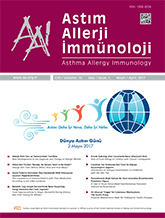


Objective: We aimed to evaluate the role of food allergies in the etiology of constipation in children who presented with chronic constipation. We investigated the effects of the allergens on constipation by eliminating the relevant allergen from diet in cases with positive food allergy testing in the study.
Materials and Methods: The study included 75 patients aged 6 months-10 years with functional constipation. The severity of constipation was assessed with the constipation symptom score. Food-specific IgE levels were evaluated in the sera while skin prick and atopy patch tests were performed by using milk, egg white, egg yolk, wheat, and soybean in all patients. For the patients with positive test results, the allergen was eliminated from the diet over 2 months. Two months later, these patients were re-evaluated by using the constipation symptom score.
Results: There was a female predominance (62.7%) in the study group. The mean age was 4.69±0.295 (mean±SD) years. The mean duration of constipation was 24±2 (mean±SD) months. The atopy patch test was positive in 4 of the 75 (5.3%) patients. Atopy patch test positivity was found for egg white and yolk in the first patient, wheat and soy in the second, wheat alone in the third, and soy alone in the fourth. The skin prick test was found to be negative in all four patients. Food mixed specific IgE levels were positive in three of the four patients with a positive atopy patch test (2.31kU/L, 2.35 kU/L, 0.1 kU/L and 1.16 kU/L, respectively). When patients were reevaluated after an elimination diet by using the constipation symptom score, the symptom score had improved in only one patient, the one with soy allergy.
Conclusion: Our findings support that food allergy has no role in chronic constipation. The atopy patch test did not make an additional contribution to the diagnosis of food allergy.